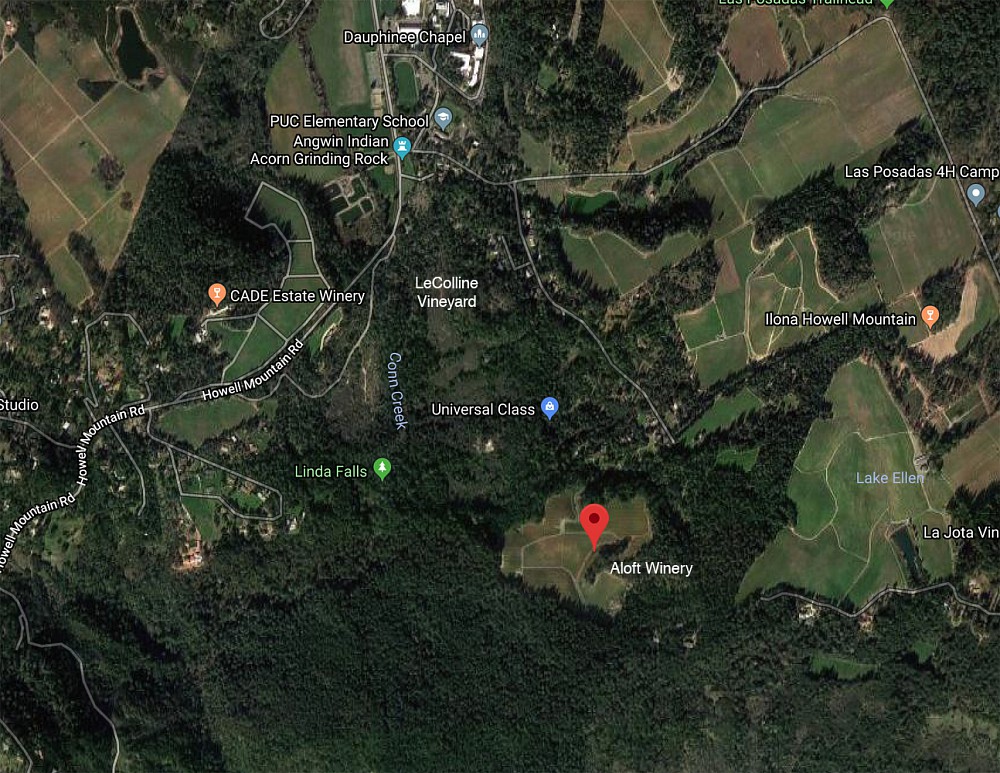Share
Aloft Winery
Aloft Winery
Bill Hocker | Nov 13, 2018 on: Remote Winery Ordinance
Wine-Searcher 11/8/18: New Mondavi Plan Upsets Some Locals
NVR 9/6/18: Proposed Mondavi family winery generates controversy in Angwin
County's Aloft Winery document page
Scions of the Mondavi family are starting over by developing a new 50,000 gal/yr winery up a dead end road outside of Angwin. The project, the Aloft Winery, has run into opposition from neighbors as being incompatible with its remote location (an outline for a CEQA lawsuit has already been submitted!). The initial presentation of the project before the Planning Commission on Sep 5, 2018 generated enough concern that it has been continued to a date uncertain while neighbors and the owners attempt to come to some consensus.
The project represents one of several projects that are receiving new scrutiny after the fires of 2017 and the close defeat of Measure C in 2018. There are issues both in the water impacts of winery and vineyard development in the watersheds and the wisdom of pursuing tourism development in rural areas that are fire prone and are seen by residents as farming communities and not commercial development zones. The issue of winery development in the watershed areas has been the subject of a series of meetings at the Board of Supervisors that may, or may not, lead to an ordinance defining winery compatibility criteria for winery locations. The two meetings thus far are discussed here:
Two projects, the Dry Creek-Mt Veeder Winery and Caldwell Winery, have already been denied this year over similar concerns, more than have been denied in the previous decade. The Anthem Winery scheduled for its second hearing on Dec 5th is similarly being opposed by residents. The Mountain Peak Winery is heading for its own CEQA lawsuit on Jan 11, 2019.
George Caloyannidis sent the link to the Wine Searcher article at the top of this post. There is a certain disdain in the title of the article which seems to reflect the attitude of the wine industry toward communities that push back against the expansion of commercial facilities into their rural midst. The article closes with chamber-of-commerce talking points voiced by a "Chicago-based drinks attorney": "it will spur job growth and tax revenue. Plus, a great facility like the one proposed will draw people to the area." Just what this remote rural neighborhood was looking for, I'm sure.
Wine-Searcher 11/8/18: New Mondavi Plan Upsets Some Locals
NVR 9/6/18: Proposed Mondavi family winery generates controversy in Angwin
County's Aloft Winery document page
Scions of the Mondavi family are starting over by developing a new 50,000 gal/yr winery up a dead end road outside of Angwin. The project, the Aloft Winery, has run into opposition from neighbors as being incompatible with its remote location (an outline for a CEQA lawsuit has already been submitted!). The initial presentation of the project before the Planning Commission on Sep 5, 2018 generated enough concern that it has been continued to a date uncertain while neighbors and the owners attempt to come to some consensus.
The project represents one of several projects that are receiving new scrutiny after the fires of 2017 and the close defeat of Measure C in 2018. There are issues both in the water impacts of winery and vineyard development in the watersheds and the wisdom of pursuing tourism development in rural areas that are fire prone and are seen by residents as farming communities and not commercial development zones. The issue of winery development in the watershed areas has been the subject of a series of meetings at the Board of Supervisors that may, or may not, lead to an ordinance defining winery compatibility criteria for winery locations. The two meetings thus far are discussed here:
NVR 9/27/18: Napa County scrutinizing surge of wineries off the beaten track
NVR 10/21/18: Napa County continues remote winery discussion
NVR 10/21/18: Napa County continues remote winery discussion
Two projects, the Dry Creek-Mt Veeder Winery and Caldwell Winery, have already been denied this year over similar concerns, more than have been denied in the previous decade. The Anthem Winery scheduled for its second hearing on Dec 5th is similarly being opposed by residents. The Mountain Peak Winery is heading for its own CEQA lawsuit on Jan 11, 2019.
George Caloyannidis sent the link to the Wine Searcher article at the top of this post. There is a certain disdain in the title of the article which seems to reflect the attitude of the wine industry toward communities that push back against the expansion of commercial facilities into their rural midst. The article closes with chamber-of-commerce talking points voiced by a "Chicago-based drinks attorney": "it will spur job growth and tax revenue. Plus, a great facility like the one proposed will draw people to the area." Just what this remote rural neighborhood was looking for, I'm sure.


